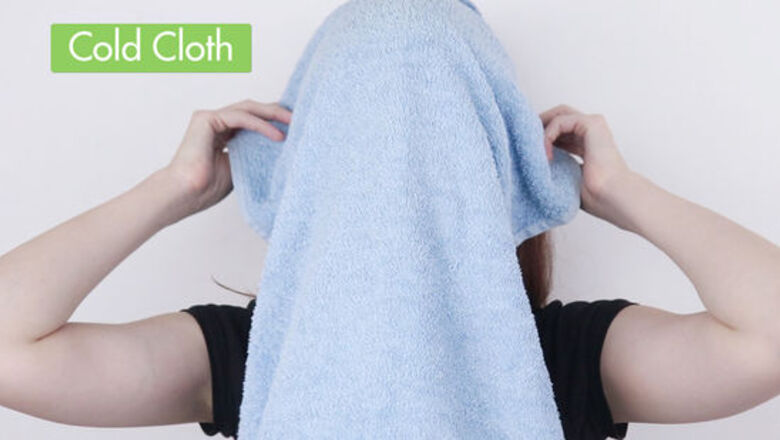
views
X
Expert Source
Melissa JannesBeauty Stylist
Expert Interview. 30 August 2019.
Start by applying bronzer in light layers on areas of your face that the sun would hit naturally. Follow up by applying blush to the apples of your cheeks.
Evening out Your Skin Tone
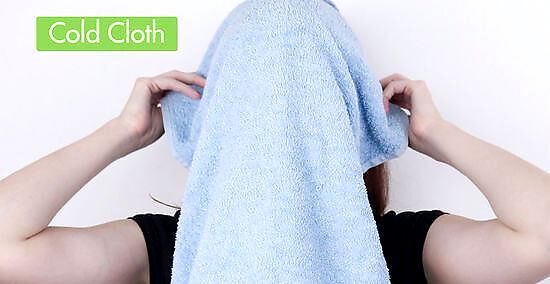
Apply a cold cloth to your face to lessen signs of skin irritation. Cooling your face will help reduce any redness and blotchiness. Before applying makeup, put a cold cloth over your face. Let it sit for 10 minutes to soothe your skin. Purchase a cooling mask from a beauty supply store to achieve the same effect.
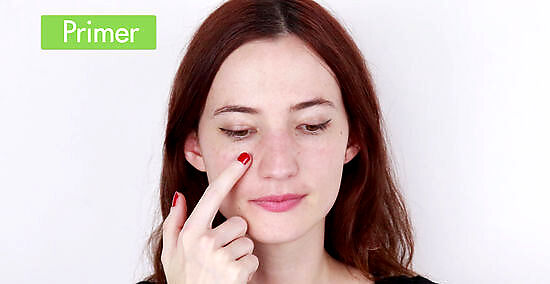
Rub a layer of primer on your face. A silicon-based primer will build a smooth surface to apply makeup over. Primer will also add moisture to your skin and ensure that your makeup lasts longer. Apply a dime-sized amount of primer to clean fingers and gently rub it over the entire surface of your face. Give the primer 2-3 minutes to dry before applying makeup.
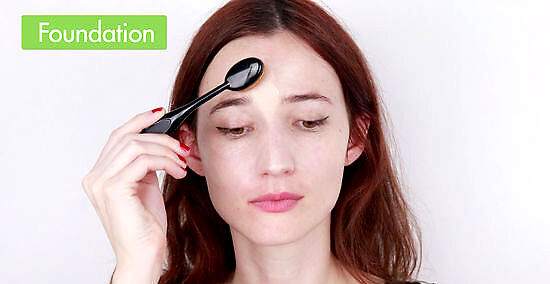
Apply foundation to your skin with a brush or sponge for total coverage. The simplest way to get the look of even skin is to apply a foundation that closely matches your skin color. Apply a quarter-sized amount of foundation to your face with a makeup sponge or brush. Avoid using your fingers as foundation can look cakey if applied unevenly.
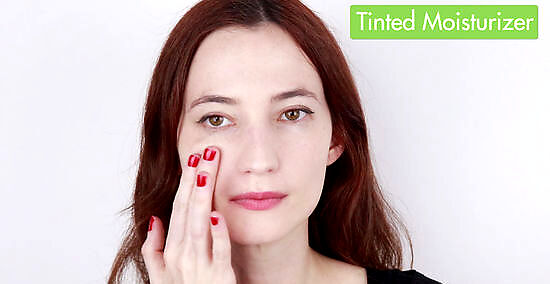
Use a tinted moisturizer instead of foundation to create a natural-looking base. If you do not want to look overly made up, skip a full coverage foundation. Opt for a moisturizer with a tinted pigmented complex. This will deposit just enough color onto the surface of your skin to lightly even out your skin tone. Apply a quarter-sized amount of tinted moisturizer to your entire face with your fingers or a clean makeup sponge. This will deposit just enough color onto the surface of your skin to lightly even out your skin tone.
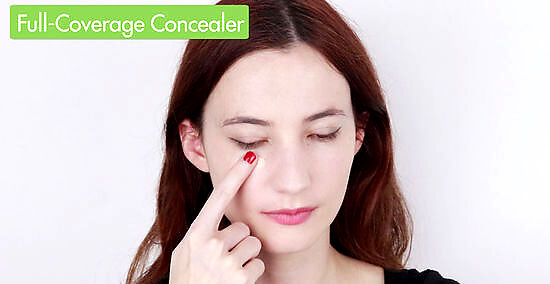
Apply full-coverage concealer if you have dark circles and blemishes. Covering uneven spots on your face will give you the look of smooth, even skin. Apply a full-coverage concealer that matches your skin color with the tip of your finger. Lightly dab 2-3 drops of concealer on dark under-eye circles and 1-2 drops on to avoid a caked-on look.
Putting on Bronzer
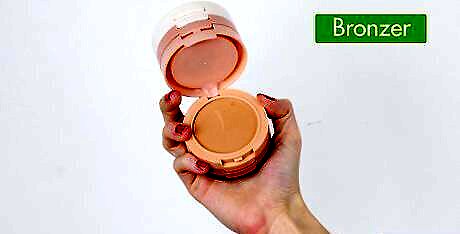
Choose a shade of bronzer that will suit your skin tone. It is important to choose a bronzer that is not too dark or light to look natural on you. Depending on your skin color, choose a bronzer made specifically for light, medium, or dark skin tones. Go for a color that’s 1-2 shades darker than your skin tone, but no more. As a general rule, lighter skin tones will require a soft, golden bronzer, while darker skin tones will look better with a dark bronze shade. If you are unsure which color will best suit you, ask a makeup artist at a department store makeup counter for help.
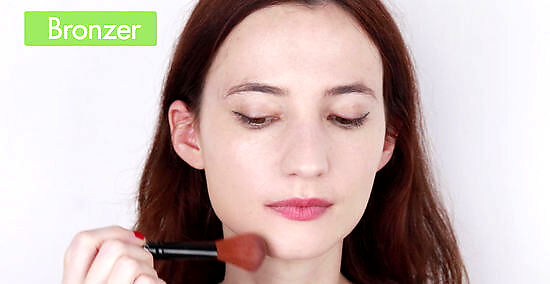
Lightly apply bronzer to your brow line and jawline with a bronzer brush. Purchase a large bronzer brush to evenly apply your bronzer. Use light, straight strokes to brush the bronzer across your forehead and on either side of your jaw. Apply multiple light layers instead of one thick layer to ensure that you do not over-apply the product.
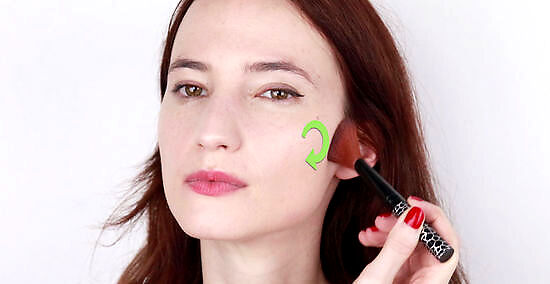
Use circular motions to apply bronzer to your cheeks and chin. Bronzer should be applied carefully to rounder parts of your face to avoid looking streaky. Hold the brush at a perpendicular angle to your face and trace small circles over the tops of your cheeks and over your chin. Apply the bronzer lightly and layer it until you achieve your desired look. Apply your bronzer very lightly on your cheeks, since you’ll be following it with another color.
Adding the Blush
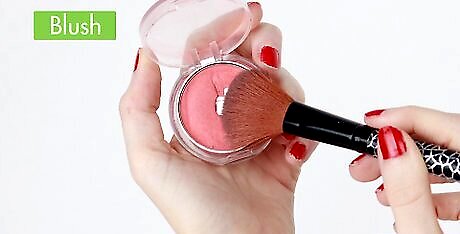
Choose a natural-looking pink blush color that suits you. Pick a blush color that is dark or light enough to suit your natural skin color. Use a blush with a pink tone, as a brownish color will look odd against the bronzer. If you are unsure what shade to choose, visit a makeup counter for expert advice.
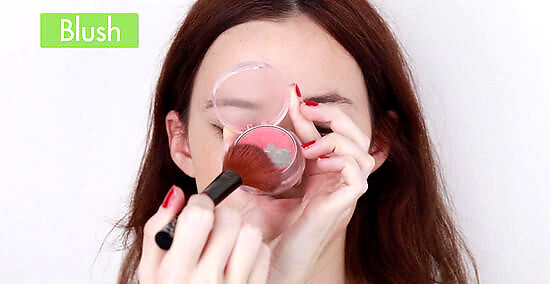
Use a small brush to apply the blush. Lightly dab a small blush brush onto the makeup to get it onto the bristles. Gently apply the color to your cheeks. Use small, circular motions to distribute the color carefully and evenly.
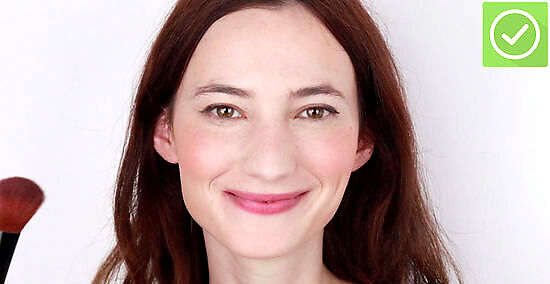
Apply blush to the apples of your cheeks. For a natural look that will complement the bronzer you already applied, focus blush on the part of your cheeks that gets naturally flushed. To locate the apples of your cheeks, smile. The parts of your cheeks that protrude are the areas you should focus blush on. Blush should not be applied past the laugh lines that separate each cheek from your nose and mouth. When you’re pairing blush and bronzer, don’t apply blush back along the cheekbone or the hollow under the cheek.



















Comments
0 comment